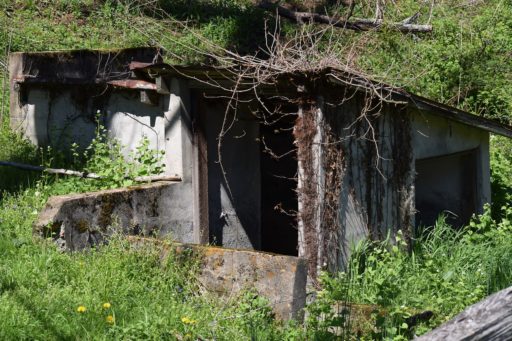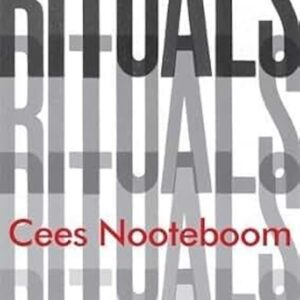Cormac McCarthy’s early novels are set in Appalachia—books populated by poverty-stricken characters who can’t comprehend the forces at work in their lives. McCarthy brings a rural culture to life through an examination of morality, personal beliefs, and the darker side of humanity. The author’s language viscerally draws readers into the themes that seem to pulse and breathe on the page.
The Orchard Keeper, McCarthy’s first novel, was published to mixed reviews in 1965. Readers questioned the book’s lack of plot and what some considered to be a haphazard structure. In The New York Times, Orville Prescott wrote, “The Orchard Keeper is an exasperating book…it is also an impressive book.” Prescott noted the writer’s “torrential power,” and that power is evident from the first italicized sentences, where we get a hint regarding one of the author’s chief concerns: an urban civilization encroaching on the natural world.
A wrought iron fence has grown into a tree, and a short passage illustrates the rural-urban conflict. McCarthy writes, “The young man came over to see. Here, said the man, look sideways here. See? He looked…It’s growed all through the tree, the man said. We cain’t cut no more on it. The Negro was nodding his head. Yessa, he said. It most sholy has. Growed all up in that tree.” This visual cue holds power, though McCarthy never editorializes or allows himself to comment on the changes his characters will face—he simply reports them.
Like his lifelong habit of not using quotation marks to denote dialogue, all of McCarthy’s formidable tools come into play in this first novel: the use of nouns as adjectives and verbs, the joining of nouns to create—or invent—adjectives, colloquial dialogue, the frequent use of proper names and precise scientific language to describe nature, and archaic words. His settings are alive and buzzing, too, and while the Appalachians can be majestic, McCarthy writes gorgeous descriptions of squalor and decay.
A simple passage shows the nameless old man (nameless through the entirety of The Orchard Keeper) watching a car through the trees, and the moon’s rising is lyrical and poetic: “Low in the east a red moon was coming up through the clouds, a crooked smile, a shard of shellrim pendant from some dark gypsy ear.” Farther down the page, a basin is “stickrimmed.” Carvings of fish on the old man’s hickory pole have a “pleistocene aspect.”
Just two pages later, The Green Fly Inn is afire, and in McCarthy’s hand, the destruction of the tavern is supernatural. The burning building inhabits the page in a way that moves beyond the event: “glass beneath it ran molten and fused in a single sheet, shaped in ripples and flutings, encysted with crisp and blackened rubble, murrhined with bottlecaps…like some imponderable archeological phenomenon.” McCarthy’s use of murrhine—an archaic word that functions as an adjective or noun—shocks the reader, especially with the addition of the -ed suffix, which is unnecessary. In my reading of this sentence, murrhined might become a verb, akin to flattened. One must wonder if there is another fiction writer at work within the English language, an author who would have chosen this word or used it in this way.
Outer Dark is McCarthy’s second novel, published in 1968. The book’s title carries weight—something ominous lurks in every passage, and one senses that, in the case of the title, McCarthy’s great care with words is vitally important, a volley the reader must immediately note. The title of this book leads the reader, then, and one can infer, before seeing the first page, that darkness will follow the characters. The idea that there is evil in the world, that it is all around us, is implicit. The dark in the title is, at once, a noun, an adjective, and possibly a verb, as defined in the Merriam-Webster Dictionary—an intransitive verb, to grow dark.
McCarthy’s words are menacing when Culla, one of the main characters, traverses a creek where trees are “malign and baleful.” While malign can serve as an adjective, English speakers are more inclined to choose malignant in daily conversation, and one tends to think of the verb here, where we might malign someone; the usage holds a connotation of evil that is animated and active—this is not an adjective, even as it describes a noun; it holds more weight than that. In the same passage, McCarthy describes the trees as “androids…alien,” and the visuals serve the very tone that guides Outer Dark—the trees, inanimate as they might be, pose a threat to Culla, and we must perceive them in that way, too.
Dialogue in Outer Dark picks up where The Orchard Keeper left off, and though a location is not named, an Appalachian dialect is apparent throughout. Culla speaks to a tinker in the first chapter, and the reader understands place and social standing: “Naw, I got to get on. Maybe next time you come thew I’ll need something.” The tinker answers Culla, “All right…I hope you’ns well.” McCarthy’s ear for speech is unfailing and informative. There is no need to tell us when or where the story takes place. McCarthy understands this community, so he can accurately reflect the language.
On each page, he is careful and thoughtful, as if a mundane word would be too much to bear. On one page, Rinthy is described as emaciate, the verb used as an adjective; on another, “the paint is open in long fents…paling upward,” and on another, the baby is “redgummed.” Fent is archaic, as is paling, and words (like red and gum) are combined to form adjectives again and again.
Suttree is Cormac McCarthy’s fourth novel and was written over the course of two decades. The novel is 471 pages long, and the language remains intense as it follows the wanderings of Cornelius Suttree, who has decided to step away from society and earn a living as a fisherman. Suttree is the most anecdotal of the books discussed here, and the timeline and locations are clear—it is a more urban book. Still, McCarthy brings beauty to each situation, where even a potato in a fire becomes a cosmic event: “In the fire potatoes blistered and split their charred jackets with low hissing sounds like small organisms expiring on the coals.” Suttree travels among and lives as one of many ne’er-do-wells, and the place of these people in society, the moral code they live by, is of great interest to McCarthy.
McCarthy examines belief systems in all the Appalachian books, and he seems to understand that characters on society’s fringes require (and deserve) rich, significant language. We are drawn to the words, made curious, made to feel an uncommon empathy for common people. The tools McCarthy employs contribute to atmosphere and theme, but they ultimately point the reader’s attention to humanity. With the care of a poet, McCarthy draws us to the simple idea that each desperate character has inherent value, and that each life can be illuminated with grace through the power of words.
Gerry Stanek has written three books set in the coal fields of Western Pennsylvania. He publishes Notes from Plattsville semi-regularly via Substack and recently released an album of rock and roll songs that’s streaming everywhere. He lives in Greensboro, NC with his three daughters. Find him at https://gerrystanek.com/





